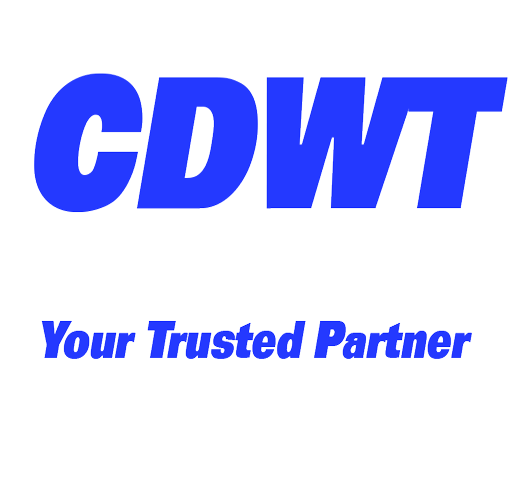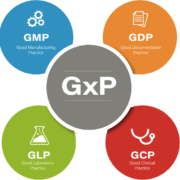GXP – Good X Practice – Compliance
Protect Data Integrity Across All Processes and Operations
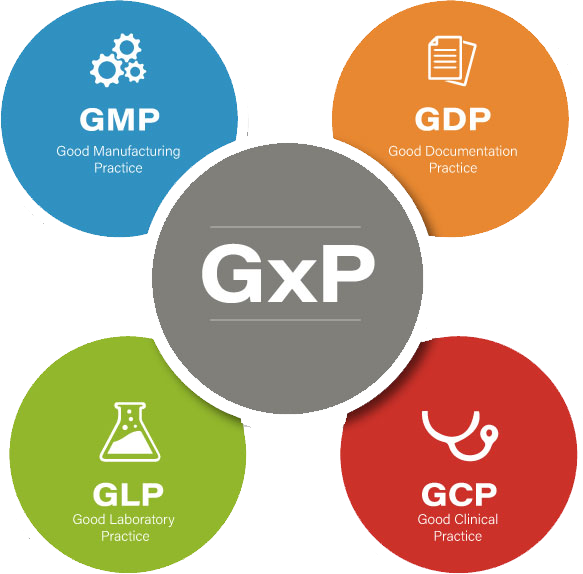
What is GxP Compliance: A Summary
GxP compliance refers to the norms and regulations applicable to companies that manufacture food and medicines. It also applies to applications for medical software. The GxP framework protects the safety of pharmaceutical and food products. It also aids in ensuring the integrity of data employed in the production of a product. The US Food and Drug Administration (FDA) has created GxP standards to assure the safe research and production of medical devices, pharmaceuticals, biologics, and other food and medical product businesses.
Good Manufacturing Practices (GMP), Good Clinical Practices (GCP), Good Laboratory Practices (GLP), and other compliance efforts are a part of GxP. The implementation of the practice guidelines and laws depends on the product type (medical devices and software) and the country in which the product will be marketed. Life sciences businesses and the Food and Drug Administration that use computerized systems to undertake GxP activities for quality management must provide full data protection.
What exactly does GXP compliance cover?
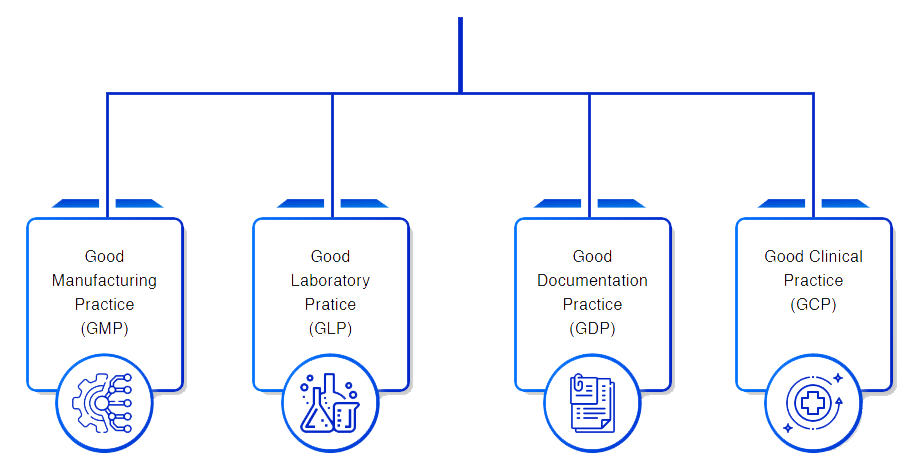
Security and compliance silos are obstacles for regulated workloads in the public cloud.
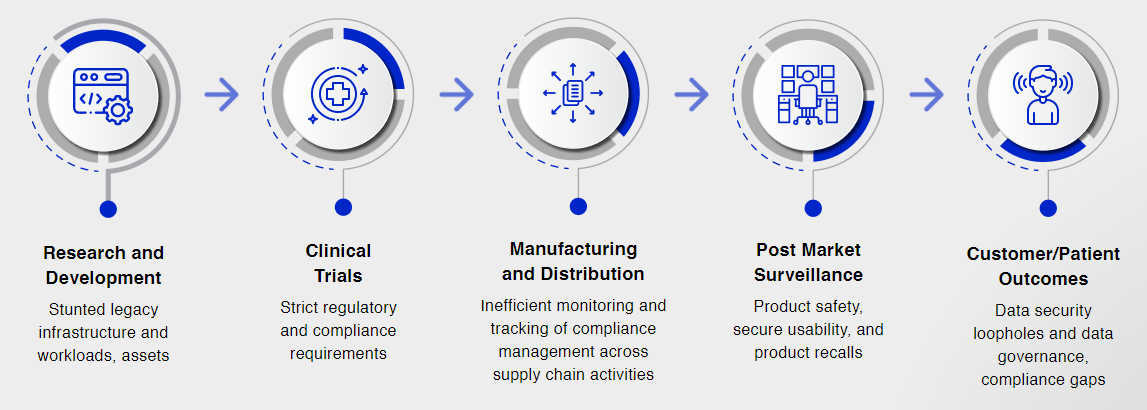
How can CDWT guarantee GxP compliance?
It is not news that the life sciences industry has progressively grown its usage of cloud technology for highly dependable, scalable, and secure IT system operations. CDWT-configured cloud infrastructure (public/private/hybrid or multi cloud), Migration and Modernization procedures, and Managed Services are intended to assist clients operate their most critical workloads, including GxP-supporting computer systems, in the cloud.
CDWT configures, modernises, and maintains scalable cloud computing platforms on any cloud with high availability and reliability, enabling you to execute a variety of applications. CDWT places the highest focus on helping to preserve the privacy, availability, and integrity of our customers’ systems and data, as well as preserving their trust and confidence.
Benefits of CDWT Managed Compliance Services for Regulatory GxP Workloads in the Cloud
CDWT provides an innovative GxP compliance solution to expedite the migration and administration of your regulated workloads to any cloud environment (public, private, hybrid and multi). SaaS (business apps), PaaS (cloud services), and IaaS are covered by CDWT (global infrastructure). You may swiftly develop a GxP-compliant framework by using CDWT’s life sciences experience, factory-based approach to cloud adoption, and managed services.
Persistent Cloud Compliance
Reduce your compliance risk and achieve continuous cloud compliance with CDWT's framework and accelerators, which are designed for Azure, AWS, GCP, OCI, and CDWT's public and private clouds.
Cloud Journey Evaluation
Using CDWT's Cloud assessment workshops, accelerate your cloud journey by identifying critical business ideas made feasible by the cloud.
Cloud Acceptance
Accelerated deployment and acceptance of cloud and commercial apps using pre-packaged solutions built using best practices from the medical sciences.
Cloud Adoption Architecture
A Cloud Adoption Framework-based production line for the migration of regulated workloads.
Compliance-as-a-Service
Cost-effective solution bundle supplied as a service to reduce compliance and innovation hurdles
Profit Generation
Prioritize value-creating activities above value-consuming ones.
Managed Compliance Services from CDWT
CDWT’s Managed Compliance Services enable enterprises to supplement their IT infrastructure, security networks, cloud platforms, data structures, and software/apps in order to become completely compliant with global legislation and standards.
We investigate customer landscapes, access functionalities, and workloads in collaboration with A-star compliance professionals and modern technologies to validate whether or not they adhere to respective protocols while bestowing effective strategies and employing critical processes to risk-proof compliance globally. CDWT Managed Compliance Services protect essential cloud platforms including hyperscaler cloud landscapes, private clouds, third-party environments, on-premises or remote ecosystems, and assist them in becoming completely compliant with the following services:
IRAP
The Information Security Registered Assessors Program (IRAP) is a collection of security procedures and frameworks designed to audit, assess, and measure an organization's cybersecurity effectiveness in accordance with Australian security laws and standards. The Australian Signals Directorate keeps an eye on this (ASD)
Bank Negara Malaysia
Bank Negara Malaysia oversees a key compliance structure and laws pertaining to BFSI operations and financial institutions (BNM)
Oman's Central Bank
Oman's Central Bank has approved regulations that apply to all BFSI services including financial institutions.
SAMA
Saudi Arabian Monetary Authority-regulated centralized cybersecurity framework and methods to aid enterprises across all sectors in efficiently protecting their operations, assets, and data.
FINMA
Swiss Financial Market Supervisory Authority regulations and frameworks for supervising banks, financial institutions, insurance companies, stock exchanges, securities dealers, and so on.
UAE Regulations
Enhanced UAE compliance with relation to data residency, privacy, and other legislation affecting corporate activities in the UAE.
RBI
Security, operational management, data administration, and other compliance rules apply to BFSI operations and financial institutions. Delivered by the Reserve Bank of India, the nation’s leading financial body.
MAS
The Monetary Body of Singapore, the country's primary BFSI authority, established guidelines on outsourcing financial institutions' operations and procedures.
OJK
The Financial Services Authority of Indonesia (Otoritas Jasa Keuangan) issues and monitors regulations on the running and operations of financial institutions.
GDPR
The General Data Protection Regulation (GDPR) is a set of advanced laws that control the gathering and use of personal data from European Union residents.
PCI-DSS
The Payment Cards Industry Data Security Standard establishes guidelines and benchmarks to guarantee that all businesses receiving, storing, and processing credit card data operate in a secure environment.
HIPAA
The Health Insurance Portability and Accountability Act establishes standards and protocols to safeguard the privacy, confidentiality, and integrity of sensitive patient information. Healthcare organizations get the HITRUST (Health Information Trust Alliance) accreditation as verification that they meet HIPAA regulations.
GXP
The GXP compliance standard is an abbreviation for regulatory standards and recommendations applicable to a larger range of life sciences, food, and medical items, among other things (the 'X' stands for any letter appropriate vertically). Good Laboratory Practices (GLP), Good Clinical Practices (GCP), and Good Manufacturing Practices (GMP) are a few examples (GMP).
ISO Standards
Introduced by the International Organization for Standardization, these frameworks validate the worldwide standard standards applicable to any item or service. The number after an ISO denotes the category: ISO-27001, ISO-27017, ISO-27018, ISO-22301, ISO-20000, and so on.

